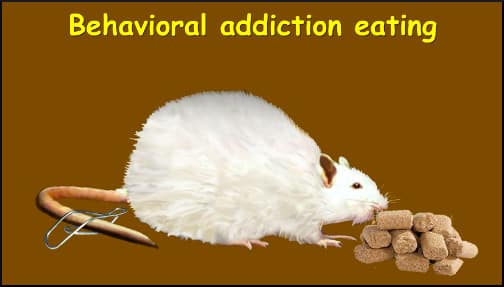
Research has been done involving lab rats, standard rat chow, and hyperpalatable foods. To see the whole fascinating picture, view the presentation that Dr. Pretlow recently took to the Global Conference on Obesity Treatment and Weight Management — especially slides 14-19.
Rats raised on lavish banquets will get fat — no surprise there. More intriguing is the evidence that, once they have gotten used to cheesecake, bacon and cake frosting, rats will put up with considerable pain to get more high-sugar, high-fat goodies.
Conversely, if rats who have only ever known nutritious and boring pellets are offered the good stuff — at the cost of enduring an electric shock first — well, those rats Just Say No. They are not that interested in discovering what gourmet fare is all about.
But never mind the fancy treats. This next part is about dull, everyday kibble. As we can see in Slide 21, a rat stressed by the nagging discomfort of a clamp on its tail, and given the chance to overeat standard rat chow, will do so to the point of obesity.
To Dr. Pretlow, this resembles displacement behavior “which is what animals do when they’re stressed.”
There is never not stress
Back in the Great Depression, when people could not afford dentistry, they invented folk remedies, such as self-inflicted torture. If you had a toothache, you could pinch yourself on the arm and obtain a very brief distraction. As long as you felt terrible anyway, you could do some hated job, like scrubbing a floor on hands and knees. If the pain was bad enough, you could repeatedly bang your head against a wall for a perverse kind of relief.
Back then, of course, people were unlikely to deal with either physical, mental or emotional pain by overeating. There simply wasn’t that much food around.
Overeating to drown out existential angst can only make things worse. When a person’s coping mechanism is a body-focused repetitive behavior (BFRB), like shoveling in spoonful after spoonful of sugary cereal, this qualifies as self-sabotage.
Very few people’s lives are improved by the addition of extra pounds. Many Americans — more than two-third of adults and about one-third of children — are overweight or obese. If asked to describe how being overweight or obese improves their lives, few would have a ready answer, because it doesn’t.
Compulsive eating is a big topic, and, as the saying goes, “It’s complicated.” For Psychology Today, Billi Gordon, Ph.D., wrote:
Emotional eating is always symbolic eating and among the chief architects of compulsive and binge eating. The probable source of conditioned fear is the associative, collateral context of aversive objects and events. It’s also likely that compulsive overeaters have more conditioned fears than normal eaters because they have more aversive experiences.
As Dr. Pretlow has said, “The bottom line is, how do we treat BFRB-type compulsive eating?”
Your responses and feedback are welcome!
Source: “Treatment of Obesity Using the Addiction Model,” Weigh2Rock.com, 2017
Source: “Symbolic Eating,” PsychologyToday, 11/23/13
Image: Weight2Rock

 FAQs and Media Requests:
FAQs and Media Requests: 











